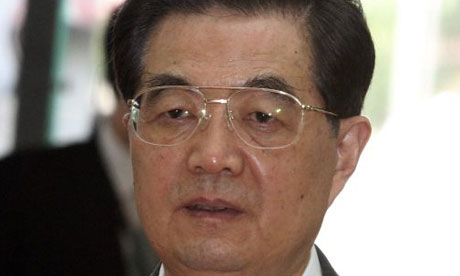Chinese government tells military to ignore internet in wake of coup talk
![]()
Regime’s jitters evident in thinly veiled reference by army newspaper to rumours that prompted crackdown on chat sites
Reuters

The Chinese army has been ordered to ignore internet rumours and stick to Communist party ideology as the leadership under Hu Jintao (above) prepares to anoint its successors. Photograph: Prin Samrang/EPA
China’s top military newspaper has told troops to ignore rumours on the internet and steel themselves for “ideological struggle” – an apparent reference to talk of a coup as the ruling Communist party faces a leadership transition.
The Liberation Army Daily did not mention rumours of a foiled junta that spread on the internet in recent weeks after the ousting of Bo Xilai, an ambitious contender for a spot in the new central leadership structure to be settled later this year.
But in a sign of jitters in Beijing, the newspaper in a front-page commentary left no doubt the party leadership wants to inoculate People’s Liberation Army (PLA) troops against rumours that could erode the authority of President Hu Jintao, who also serves as head of the party and chairman of the Central Military Commission, which commands the PLA.
Some websites and internet services were shut down or restricted as the regime rushed to stamp out the coup claims.
The paper exhorted soldiers to “resolutely resist the incursion of all kinds of erroneous ideas, not be disturbed by noise, not be affected by rumours, and not be drawn by undercurrents, and ensure that at all times and under all circumstances the military absolutely obeys the command of the party central leadership, the central military commission and Chairman Hu”.
The commentary directed at the military follows other remarks aimed at reinforcing the party’s grip on opinion after an unsettling two months of political upheaval and rumours, at a time the leadership prizes stability.
In late March, the authorities shut 16 Chinese websites and detained six people accused of spreading rumours about unusual military movements and security in the capital, feeding talk of an attempted coup or schism in the leadership.
The rumours fed on speculation about the ousting of Bo Xilai, who in mid-March was removed as party boss of Chongqing city in south-west China. A month earlier his vice-mayor, Wang Lijun, fled to a US consulate, triggering a scandal exposing accusations of infighting and abuses of power.
Bo had wrapped himself in populist rhetoric and egalitarian vows, and his removal has stirred open opposition from leftist supporters who see him as the victim of a plot.
The Liberation Army Daily mentioned none of this. But it said the military must maintain a tight grip on troops’ access to the internet in the middle of what it called an “ideological struggle” before the 18th Communist party congress late this year when Hu and his cohort will retire.
“Historical experience shows that whenever the party and country faces major issues, and whenever reform and development reach a crucial juncture, struggle in the ideological arena becomes even more intense and complex,” said the newspaper.
“We must pay close attention to the impact of the internet, mobile phones and other new media on the thinking of officers and troops.”
Related Articles
Hollande, ¿primera elección o mal menor?
![]()
La primera vuelta de las elecciones presidenciales francesas estuvo llena de sorpresas. La menor fue la victoria del candidato socialista,
The NSA Has Effectively Destroyed Internet Privacy
![]()
Snowden’s Latest The revelations this week by whistle-blower Edward Snowden (through documents provided to the Guardian, the New York Times and Propublica) prove that
Zapatistas se movilizan en Chiapas en el inicio de la nueva era maya
![]()
Indígenas de cinco regiones marcharon en silencio en algunas localidades para reivindicar su movimiento y hacer una declaración OCOSINGO (CNNMéxico)


